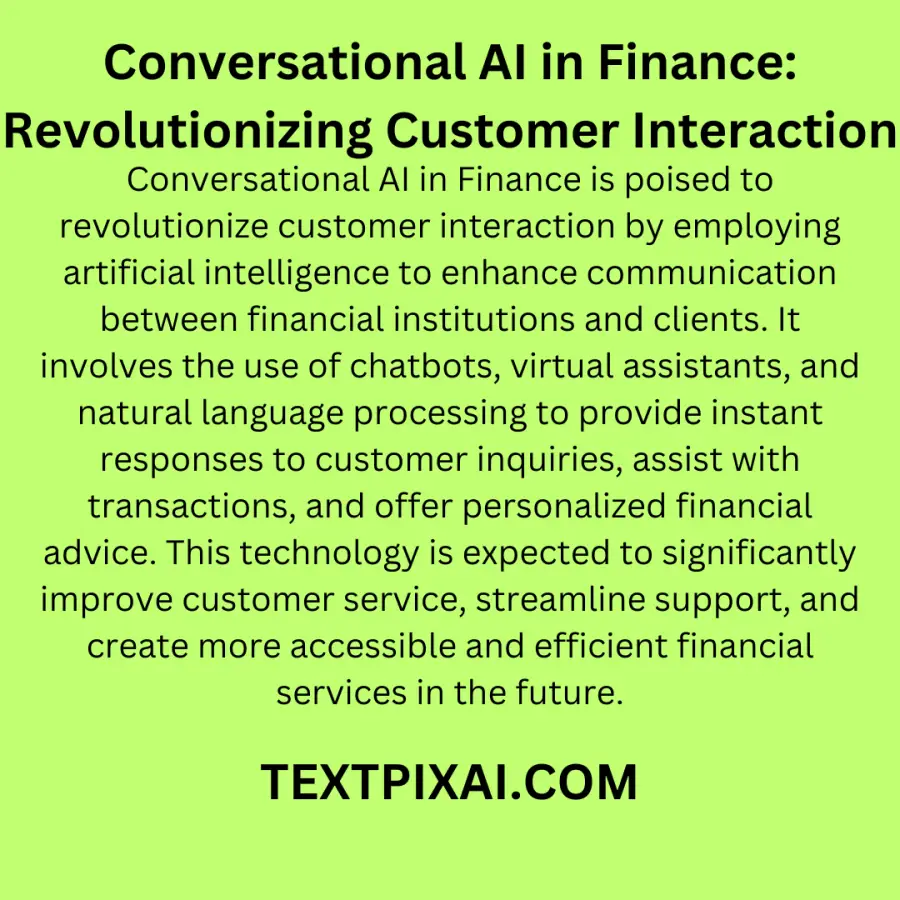Conversational AI in Finance: Revolutionizing Customer Interaction
Introduction
The financial industry has always been at the forefront of technological advancements. Conversational AI is the latest innovation that has taken the sector by storm. This article explores the impact of Conversational AI in finance, highlighting its benefits, challenges, and future prospects.
The Rise of Conversational AI in Finance
In recent years, the financial sector has witnessed a significant shift towards automation and digitalization. Conversational AI, powered by natural language processing and machine learning, is at the heart of this transformation. It enables banks and financial institutions to engage with customers in real time, 24/7.
Understanding Conversational AI
Conversational AI refers to the use of chatbots, virtual assistants, and voice recognition systems to facilitate human-like interactions between customers and financial institutions. These AI-driven systems can understand and respond to customer queries, provide account information, and even execute transactions.
You may also like to read:
Conversational AI in Finance: Revolutionizing Customer Interaction
Benefits of Conversational AI in Finance
1. Enhancing Customer Support
Conversational AI ensures round-the-clock customer support. Whether a customer needs to check their account balance, report a lost card, or inquire about loan options, AI-driven chatbots are always ready to assist, eliminating the need for customers to wait in long phone queues.
2. Personalized Recommendations
Through machine learning algorithms, Conversational AI can analyze a customer's transaction history and offer personalized financial advice and product recommendations. This level of personalization enhances the customer experience and can lead to increased sales for financial institutions.
3. Streamlining Banking Processes
Conversational AI streamlines internal banking processes as well. It can automate routine tasks like data entry, account verification, and document retrieval, allowing employees to focus on more complex and value-added tasks.
4. Security and Compliance
Ensuring the security of sensitive financial data is paramount. Conversational AI systems are designed with robust security protocols to protect customer information. Additionally, they can help institutions maintain compliance with industry regulations.
Challenges and Considerations
While Conversational AI offers numerous advantages, there are challenges to consider. These include the need for continuous training and updates, ensuring accuracy in responses, and managing customer expectations when they interact with AI instead of humans.
Implementing Conversational AI
Implementing Conversational AI requires careful planning and integration into existing systems. Financial institutions must select the right AI platform, train their AI models, and create a seamless user experience.
Real-world Applications
Conversational AI is already being used across the finance industry. Some banks use chatbots for onboarding new customers, while others employ virtual assistants to provide financial advice. The applications are diverse and continually evolving.
Future Trends
The future of Conversational AI in finance is promising. As technology advances, we can expect even more sophisticated AI systems that provide a seamless and highly personalized banking experience. Additionally, AI-powered fraud detection and risk assessment will become increasingly vital in maintaining financial security.
Conclusion
Conversational AI is revolutionizing the financial industry by providing efficient, personalized, and secure customer interactions. Embracing this technology is not just a choice; it's a necessity for financial institutions looking to stay competitive and meet the evolving demands of their customers.
FAQs
1. Is Conversational AI secure for handling financial transactions?
- Yes, Conversational AI systems are designed with robust security measures to protect financial data.
2. How can Conversational AI benefit small banks and credit unions?
- Small financial institutions can leverage Conversational AI to provide efficient customer support without the need for a large support team.
3. Can Conversational AI replace human customer service agents entirely?
- While AI can handle many routine tasks, human agents are still essential for complex and empathetic interactions.
4. What are some potential challenges in implementing Conversational AI in finance?
- Challenges include training AI models, maintaining accuracy, and managing customer expectations.
5. What does the future hold for Conversational AI in finance?
- The future promises even more sophisticated AI systems, personalized services, and enhanced security features.








